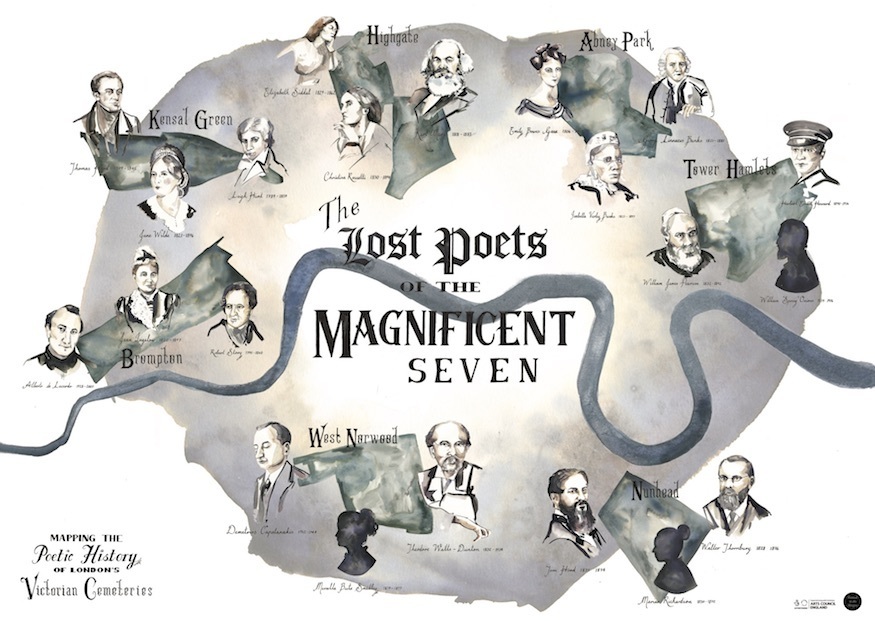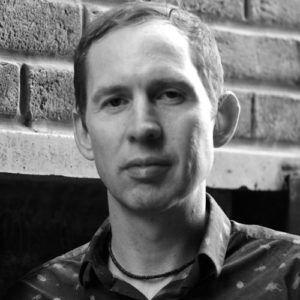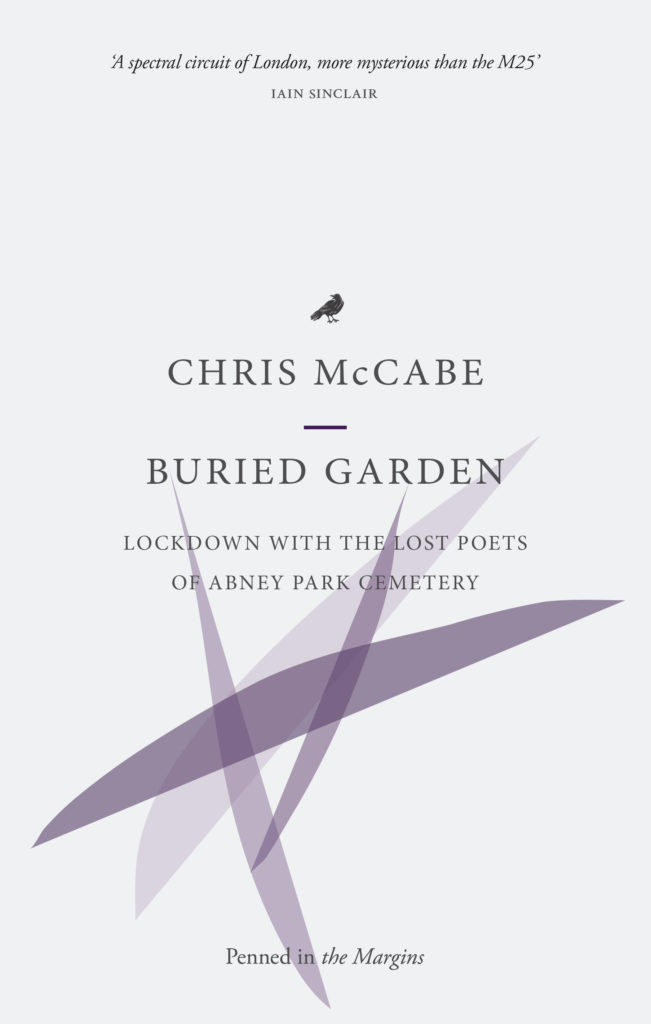Book Review – Halloween 2021
Buried Garden is the fourth volume of Chris McCabe’s exploration of the so-called lost poets of London’s Victorian cemeteries. These burial places, now known as the Magnificent Seven, were established on greenfield sites on the edges of an ever-expanding nineteenth-century London in a bid to relieve the overcrowding of the capital’s inner-city churchyards and to house its growing army of the dead.
This book, published appropriately enough on the day of Halloween, is an attempt to unearth, in a literary sense, the forgotten poets buried beneath the soil of Abney Park Cemetery in Stoke Newington. Other volumes, three already published and another three yet to come, delve beneath the earth of the cemeteries at West Norwood, Nunhead, Tower Hamlets, Highgate, Kensal Green and Brompton.
 Abney Park is the buried garden of the title. Like so many other cemeteries of this era it was once an immaculately-tended garden with flowers, lawns and trees, all providing a suitable backdrop for the memorial stones of Victorian certainty. Now, as with many others, it has become an overgrown tangle; perhaps not an entirely neglected space, but certainly one where nature has been allowed to reclaim her own. It is a place frequented by dog walkers, contemplative wanderers, dogged joggers, al fresco drinkers and unreformed lurkers.
Abney Park is the buried garden of the title. Like so many other cemeteries of this era it was once an immaculately-tended garden with flowers, lawns and trees, all providing a suitable backdrop for the memorial stones of Victorian certainty. Now, as with many others, it has become an overgrown tangle; perhaps not an entirely neglected space, but certainly one where nature has been allowed to reclaim her own. It is a place frequented by dog walkers, contemplative wanderers, dogged joggers, al fresco drinkers and unreformed lurkers.
To stand at the gates of Abney Park Cemetery is to stare through a portal into the afterlife. People walk past here all the time, missing the gateway.
But there is, suggests Chris McCabe, another garden at Abney Park: a garden of the imagination, or perhaps even one existing in an alternative reality. Arthur Machen’s secret garden of Stoke Newington, as described in his story N, constantly infiltrates its way into McCabe’s researches and his wanderings through the cemetery. This notion of a hidden garden constantly disorientates, disturbs and excites McCabe’s consciousness as he explores Abney Park and leads him to speculate that it may well be the location of Machen’s visionary oasis. Whether this garden is an actual physical space or, perhaps, the site of a portal through to another location is left for the reader to decide.
McCabe conducted his field research earlier this year just as the restrictions of the second English lockdown were being eased. Other people may have taken the lifting of travel and mixing restrictions as a chance to visit friends and family or check in at their place of work. For McCabe, however, it was the opportunity to take a train from his home in Liverpool to spend time wandering around a cemetery in North London.
But who are the lost poets, and why are some writers from this era still remembered and others, often widely celebrated at the time, now all but forgotten? McCabe locates and ponders over the graves of several writers who fit into the latter category, among them George and Isabella Varley Banks, Rev. Dr. Hibbert Newton, Josiah Conder, Thomas William Robertson, Dr. Alexander Japp, Alice R. Cron, William Hone, Rev. Thomas Toke Lynch, Eric Walrond and Emily Bowes Gosse.
Bowes Gosse is an interesting example of a once revered but now lost poet. She was something of a polymath: a landscape painter, poet and author of gospel tracts. Her posthumously published Narrative Tracts (1864) was distributed to over 7 million readers, yet it is her evolution-denying naturalist husband, Philip Gosse, who is the better remembered. Indeed, when McCabe finally finds the ivy-strewn Gosse gravestone the only discernible reference to Emily on it is the inscription: ALSO HIS WIFE.
Isabella Varley Banks, McCabe discovers, is also buried at Abney Park. She is still remembered as the author of political novels and as a campaigner for the Anti-Corn Law League. Indeed, I was easily able to obtain a secondhand copy of her best known novel, The Manchester Man, while working on this piece. Yet, although Varley Banks was a widely-read poet in her day, she is now rarely remembered for her verse.
Less than a year after George Floyd was publicly executed in a Minneapolis street for allegedly passing a counterfeit banknote, McCabe located the grave of Guyana-born journalist Eric Walrond in Abney Park. Although he passed away as recently as 1966, Walrond’s poetry is forgotten and long out of print. However, his highly-rated short story collection, Tropic Death, is still available. Reading this work, McCabe is taken aback to discover ‘startling metaphors, personification, assonance, alliteration, anaphora’. Indeed, the techniques of a potential poet.
McCabe has set out to create an ambitious and important body of work with these seven volumes and I look forward to reading the remaining three. The latest, Buried Garden, is deeply researched and wide-ranging in its vision. McCabe writes with energy and verve and manages to effortlessly blend academic research, reportage, speculative fiction, poetry, dreams and fragments of found fiction.
I still say Abney Park Cemetery is Stoke Newington’s paradise garden, just as Machen describes it in N. What some people have described as madness can just as easily be explained as poetry.
So why are some poets remembered and others forgotten? There certainly seems to be a gender bias in who is admitted to the poetic canon. Our society happily celebrates male genius while talented women are often ignored. Looking at the examples of verse from the (mainly male) poets that McCabe unearths, however, it is not hard to see why some of them are best forgotten. He is yet to turn up a neglected Tennyson, Hopkins or Yeats. Ultimately I suspect we will not have a definitive idea of who might be London’s great lost poet until the end of McCabe’s seventh and final volume.
Chris McCabe
 Chris McCabe’s work spans artforms and genres including poetry, fiction, non-fiction, drama and visual art. His work has been shortlisted for the Ted Hughes Award and the Republic of Consciousness Prize. His latest poetry collection, The Triumph of Cancer, is a Poetry Book Society Recommendation and he is the editor of several anthologies including Poems from the Edge of Extinction: An Anthology of Poetry in Endangered Languages. His first novel, Dedalus, is a sequel to Ulysses; his second, Mud, a version of the legend of Orpheus and Eurydice, set beneath Hampstead Heath. He works at the National Poetry Library as the National Poetry Librarian.
Chris McCabe’s work spans artforms and genres including poetry, fiction, non-fiction, drama and visual art. His work has been shortlisted for the Ted Hughes Award and the Republic of Consciousness Prize. His latest poetry collection, The Triumph of Cancer, is a Poetry Book Society Recommendation and he is the editor of several anthologies including Poems from the Edge of Extinction: An Anthology of Poetry in Endangered Languages. His first novel, Dedalus, is a sequel to Ulysses; his second, Mud, a version of the legend of Orpheus and Eurydice, set beneath Hampstead Heath. He works at the National Poetry Library as the National Poetry Librarian.


What an amazing project!
Isn’t it just! How on earth does he manage his other work with this 7-volume project on the go?